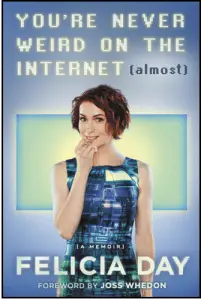You’re Never Weird on the Internet (almost)
Felicia Day
Touchstone Books
Release Date: August 11, 2015
ISBN 978-1-4767-8565-3
In 2007, something fun happened on the internet: The Guild, a web series based on the lives of a group of gamers, posted its first season on You Tube. The game upon which the series was centered (known only as The Game) was not-so-loosely based in the immensely popular online game, “World of Warcraft” (which had reached over 8 million subscribers by the time the series aired).
The Guild was written by, produced by, and starred an incandescent “new” face: Felicia Day. As the nerdy, slightly neurotic, and goofily charming gamer Cyd Sherman (known as “Codex” in the Game), Felicia Day humanized the player behind the keyboard and became an instant touchstone with many who held similar interests but didn’t fit into the typical gamer stereotype. After all, Felicia Day wasn’t just an actress/producer/writer. She was a gamer, had lived that addictive life of online gaming. She was a nerd, a geek. She was – and is – one of “us”.
The Guild became an instant internet sensation, lasting six seasons, with Felicia Day at the helm through the entire run. She also starred in Doctor Horrible’s Sing-Along Blog in 2008, becoming an entrenched member of the Whedonverse – the sphere of influence shepherded by writer/producer/director powerhouse Joss Whedon (Buffy the Vampire Slayer, Firefly, Marvel’s The Avengers, to name just a few). Her name, and skills, were linked with such genre fanbase darlings as Nathan Fillion, Neil Patrick Harris and Wil Wheaton, and her witty, humble and accessible presence on social media, especially Twitter (even before Twitter was “a thing”) endeared her to many in gamer/geek/nerd/entertainment communities.
Since The Guild, it seems like Felicia Day has been everywhere, with The Guild tie-ins such as chart topping music videos with her Knights of Good teammates (such as the hilarious “Do You Wanna Date My Avatar”) and a comic book series; writing and starring in another game-based web series, Dragon Age: Redemption, appearing on Wil Wheaton’s Tabletop gaming show, adding her vocal talents to “Fallout: Las Vegas”, guest starring in the television show Supernatural, hanging out in the monthly “Vaginal Fantasy Book Club” (an online discussion of alt/romance books), and even launching her own production company, Geek & Sundry, as well as popping up in online and cable endeavors of friends and acquaintances, tweeting, maintaining a popular blog, speaking out on women’s/gamer/geek/nerd issues…
As a fellow female gamer, geek and internet nerd, I thought I kinda sorta “knew” Felicia Day. Her high visibility without blatant self-promotion and her openness and accessibility made her seem more a girlfriend-in-abeyance rather than a garden variety celebrity. So it was with great anticipation that I picked up a copy of her recently released memoir, You’re Never Weird on the Internet (almost), wondering what I might find in its pages.
I read it in one day. Devoured it. And came away feeling that my previous impression of her was, well, pretty much spot on. In fact, her friendly, accessible, “aw, shucks, dammit” persona was reinforced for me by reading her book. Enhanced, even.
Sure, I learned about her eccentric upbringing, growing up in the deep South, about how she was home schooled, and what an impact a fledgling knowledge of computers, gaming, and the newfangled internet had on her life. (Although I’m a bit older than Felicia, I, too, remembered back when dial-up was the only way to connect to the internet, when CompuServe was the only commercial online service, and the giddy excitement when Prodigy came on the scene.) I chuckled at her adolescent awkwardness and her youthful exuberance, marveled at her early entry into college with a double major in violin and mathematics. I ached with her as she struggled, post-college, to find her way in a world full of others competing for the same things she struggled to find, with how she wasn’t quite pretty enough or quite experienced enough or quite voluptuous (or unprincipled) enough to break through in Hollywood. I could relate when she wrote about finding a desperately needed community in her online gaming friends, but also how her own foray into “World of Warcraft” threatened to eclipse the rest of her life, and the desperation she felt when she struggled to turn away from the oh, so accessible online goals and successes of gaming to the real life struggles and disappointments of finding a passion that could support her and bring her out into the world.
What really astonished me, though, was how The Guild came about, and how it was realized. I live in a family of gamers, and The Guild was on my kids’ radar from the onset; they’re the ones that told me I just had to watch it. I had heard that it was clever, and endearing in its familiarity, and I knew it had been produced on a shoestring – but I had no idea just how worn and thin that shoestring truly was.
Watching the series that first year, I never would have suspected that Felicia had made the Guild’s logo herself, using MS Paint and a mouse, or that it was shot entirely in their own houses (Felicia once had to pay the fellow next door $11 – all the money she had – to stop using his leaf blower for half an hour so they could finish a scene). That they begged, borrowed, snatched up or even, um, acquired virtually all the props and furnishings in the show sans cost – all of them (“We need a baby. Who do we know who’s bred recently?”). Craigslist was too expensive, but Freecycle became a hotbed of frantic grab-ism. Trash bedecked the shelves in Bladezz’s basement “mancave”. The poster behind Tinkerballa’s gaming desk was wrapping paper that Felicia had drawn on with a Sharpie. Later, when I bought one of the DVDs of the first season, I may have saved the packaging had I realized that it was Felicia Day who had wrapped and addressed it.
Let’s just say that my eyes were opened. Not so much to marvel at what Felicia had done, but in the realization that anyone could do it, had they simply not given up, or decided that their ideas were too farfetched to usher into reality. Yes, Felicia Day is amazing. But, she’s also so gosh darned real. A real person, with a real life, real anxieties, real shortcomings, just like the rest of us. And her memoir feels just as real and fresh as she seems to be.
That’s the best thing about You’re Never Weird on the Internet (almost). It’s not just what Felicia Day says, it’s how she says it. You don’t feel like you’re reading a book, you feel like you’re having a (albeitly one-sided) conversation with someone who’s really smart, sassy, funny and fun. Felicia makes fun of herself, and she never apologies for her shortcomings. She’s flippant where the situations get ludicrous, she’s endearing when relating eccentricities, she’s honest with her anxieties and fears, she’s giddy when unexpected pleasures bloom, and she’s passionate about things she cares about: gaming, gamers, women’s issues, geeks, her friends, her fans, and believing in yourself. And she’s funny. Truly, genuinely, sometimes irreveretly funny, without the standup shtick or the see-how-clever-I-am bravado. I chuckled and laughed and chortled and guffawed throughout the entire book.
George R. R. Martin (the author of Game of Thrones, and the other books in the “Song of Ice and Fire” series), wrote of You’re Never Weird on the Internet (almost): “Reading this is like sitting down and having dinner with (Felicia), and hearing the story of her life between the clam chowder and the cheesecake. I can’t imagine a more charming or amusing dinner companion. Felicia is a lot of fun, and so is her book.”
George is right. Felicia Day is fun. And sassy. And passionate. And just-like-us amazing. And so is her book.
Go out and get it. Read it. Have fun. That last one isn’t a directive – it’s a statement of fact.
~ Sharon Browning


Comments are closed.